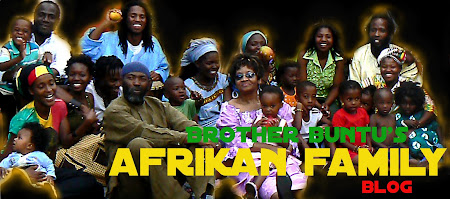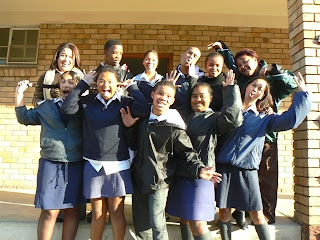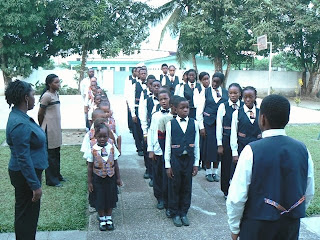
Media release for Kwanzaa Celebration 2007
South Africans are getting ready to celebrate KWANZAA this December
The Global Afrikan Congress of Azania, in collaboration with Amen Ra Institute, U.N.I.A. South Africa, Sounds of Edutainment, R.I.S.E. Mzansi/Phakamani, cultural entrepreneurs and community organizations is currently preparing for the 6th annual celebration of Kwanzaa; a Celebration of the Afrikan Family, Our Community and Achievements.
The celebration will take place on 26th December from 12h00 noon, on 7th Street in the famous community known as Fietas (Vrededorp) next to Auckland Park. The program will include spiritual processions, presentations by children, short speeches from community Elders, poetry and music. The guests will come from all over Gauteng and are all expected to bring some food for the Common Table, from which everyone will feast together, before dancing away to cultural sounds.
Preserving Our Afrikan Cultural Heritage
The theme for 2007 is ‘Preserving our Afrikan Cultural Heritage’. We have chosen the theme “Preserving our Afrikan Cultural Heritage”. But, what is meant by “preserving”, and what is our Afrikan cultural heritage anyway? According to Brother Buntu - Secretary General, Global Afrikan Congress: ‘In our recent Afrikan experience (over the last 500 years), our culture has been ridiculed, suppressed and made to appear non-functional and remote. And this is, sadly, a view many of us have adopted ourselves. Some of us now think we are clever because we excel in European languages, look fly in Western suits and feel powerful for driving the latest Japanese car. It is almost like some of us believe we have “transcended” Afrikan-ness; this backward, non-sensical culture of mambo-jambo! That’s how many of us feel today. Our culture is under siege, and needs to be defended. Hence, part of our “preserving” action is to analyze what Westernization has done to us, psychologically, spiritually and economically. And find practical means and ways to rebuild our cultural foundation.”
7 days of yet another Kwanzaa Celebration
The Pan Afrikan Holiday of Kwanzaa will be observed by millions of Afrikans and Afrikan Descendants around the world this year. The holiday is observed from 26 December until 1 January. We call all Afrikans in Gauteng and other provinces to unite and gather around the seven principles of Kwanzaa, Umoja (Unity), Kujichagulia (Self Determination), Ujima (Collective Work and Responsibility), Ujamaa (Cooperative Economics), Nia (Purpose), Kuumba (Creativity) and Imani (Faith).
South Afrikans in Gauteng are ready to celebrate Kwanzaa
It is estimated that more than 25 million Afrikan People around the world are celebrating Kwanzaa. Also many South Afrikans are celebrating this significant ceremony, with deep roots in Southern Afrikan culture.. The Global Afrikan Congress has every year since 2002, hosted and engaged children, youth, women, adults and elders in and around Gauteng townships and locations, to remember this celebration of unity and oneness, ‘Matunda ya Kwanzaa’.
Afrikan culture must be transmitted to the youth
One of well respected radio personalities, Mama Kenalemang Kgoreadira, attested that “Culture and heritage must be transmitted and shared to the young generation and that in terms of the Batswana practice Kwanzaa means “Go Loma” or “Letlhabula” and that the role of the King/Kgosi and the tillers\Balemi of the soil is the highest significance.’
Remembering our heroes
In advocating and representing the youth of today, former Pan Africanist youth congress of Azania (PAYCO) President Sbusiso Xaba said: “This Pan Afrikan cultural holiday reminds us where were come from and where we are going, this year is significant in the sense that we remember Steve Bantu Biko 30 years on and now 2008 will mark 30 years since Mangaliso Sobukwe passed on -27th February 1978.
Kwanzaa 2007 quotes
“Kgosi ke Kgosi ka Batho”
“A people without their history or culture are lifeless leaves, drafting aimlessly over the oceans of time”
Ntate Kgalushi Koka
“Among the principles of Afrikan Culture the following are to be noted: Hospitality, Respect-especially to Elders, Importance of Woman-especially in cases of inheritance, Humane treatment of law breakers, Spiritual reflection, Common use of land, Constant employment of music-especially drums and bright colours"
Walter Rodney
“One of the most difficult things to do these days is to talk with authority on anything to do with Afrikan Culture. Somehow Afrikans are not expected to have any deep understanding of their own culture or even of themselves”
Steve Bantu Biko
“Culture: The manifestation and expression of the Afrikan spirit through cultural mediums, eg language, names, garments, rituals, ceremonies, music, dance, value systems, art, aesthetics, agriculture, politics, economics and education. This culminates into a process which gives a people a general design for living and patterns for interpreting their reality”
AAD WCAR 2002 Official Report
INFO & CONTACT:
Contact: Ras Sipho Gideon Mantula, Media and Liaison Coordinator, GAC Azania
Phone: 084 781 5587 or 011 830 2546


















.jpg)




